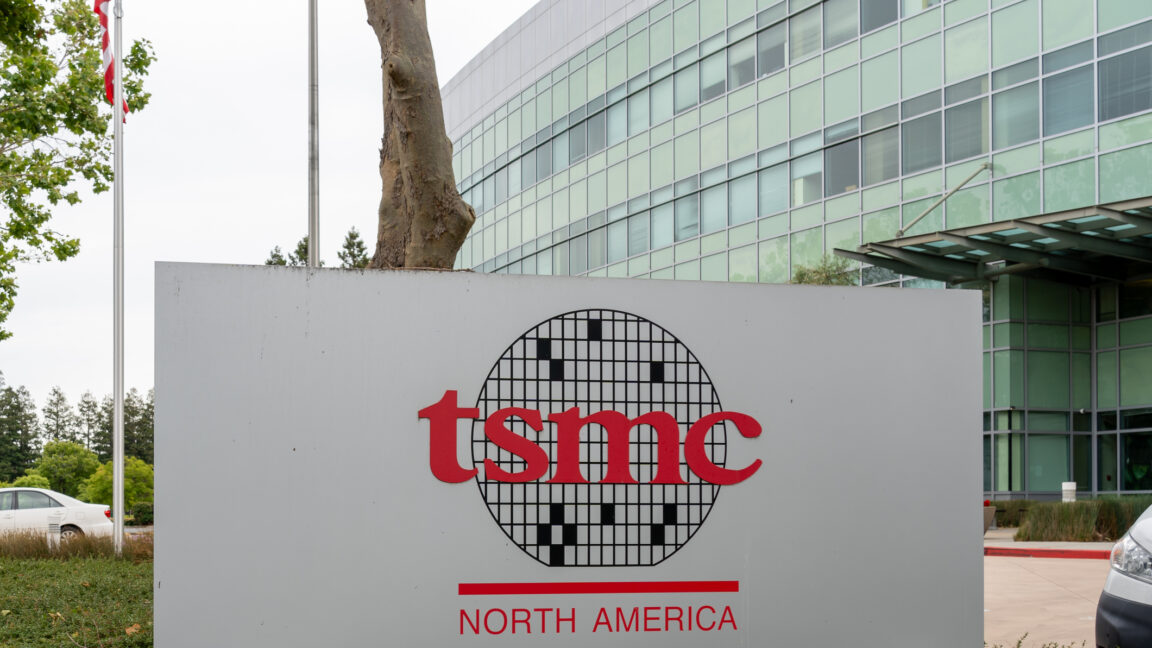
ARSTECHNICA.COM
Trump can’t keep China from getting AI chips, TSMC suggests
Losing track
Trump can’t keep China from getting AI chips, TSMC suggests
As Trump eyes chip controls, TSMC fears its tariff-proof era will end.
Ashley Belanger
–
Apr 21, 2025 1:33 pm
|
20
Credit:
JHVEPhoto | iStock Editorial / Getty Images Plus
Credit:
JHVEPhoto | iStock Editorial / Getty Images Plus
Story text
Size
Small
Standard
Large
Width
*
Standard
Wide
Links
Standard
Orange
* Subscribers only
Learn more
As the global artificial intelligence (AI) race presses on amid a US-China trade war, the Taiwan Semiconductor Manufacturing Company (TSMC)—a $514 billion titan that manufactures most of the world's AI chips—is warning that it may not be possible to keep its customers' most advanced technology out of China's hands.
US export controls require chipmakers to monitor shipments and know their customers to restrict China's access to AI chips. But in a recently published 2024 report, TSMC confirmed that its "role in the semiconductor supply chain inherently limits its visibility and information available to it regarding the downstream use or user of final products that incorporate semiconductors manufactured by it."
Essentially, TSMC expects that it plays too big a role in the semiconductor industry to stop all the possible unintended end-uses of the semiconductors it manufactures. Similarly, it appears impossible to track all the third parties determined to skirt sanctions. And if TSMC's hands are truly tied, that ultimately means that the US can't effectively stop the latest AI tech from trickling into China.
That remains a problem for TSMC, since, back in October, a research firm called TechInsights took apart an AI accelerator from China-based and US-sanctioned Huawei and found that TSMC had produced the AI chip made by Nvidia that powered the product, Bloomberg reported. The semiconductor company increasingly risks sanctions for failing to comply with export controls, TSMC's report said, even if it seemingly has nothing to do with its customers diverting shipments into China.
At that time, TSMC promptly notified US officials of the feared national security risk, confirming that one of its customers' chips "might have been diverted to a restricted entity or incorporated into a restricted entity’s product," TSMC's report said. However, although the company fully cooperated with the resulting US and Taiwan government probes, TSMC said, there currently appears to be no perfect solution to deter recurring violations.
"Despite TSMC’s best efforts to comply with all relevant export control and sanctions laws and regulations, there is no assurance that its business activities will not be found incompliant with export control laws and regulations," TSMC said.
Further, "if TSMC or TSMC’s business partners fail to obtain appropriate import, export or re-export licenses or permits or are found to have violated applicable export control or sanctions laws, TSMC may also be adversely affected, through reputational harm as well as other negative consequences, including government investigations and penalties resulting from relevant legal proceedings," TSMC warned.
Trump’s tariffs may end TSMC’s “tariff-proof” era
TSMC is thriving despite years of tariffs and export controls, its report said, with at least one analyst suggesting that, so far, the company appears "somewhat tariff-proof." However, all of that could be changing fast, as "US President Donald Trump announced in 2025 an intention to impose more expansive tariffs on imports into the United States," TSMC said.
"Any tariffs imposed on imports of semiconductors and products incorporating chips into the United States may result in increased costs for purchasing such products, which may, in turn, lead to decreased demand for TSMC’s products and services and adversely affect its business and future growth," TSMC said.
And if TSMC's business is rattled by escalations in the US-China trade war, TSMC warned, that risks disrupting the entire global semiconductor supply chain.
Trump's semiconductor tariff plans remain uncertain. About a week ago, Trump claimed the rates would be unveiled "over the next week," Reuters reported, which means they could be announced any day now.
TSMC is apparently already bracing, as industry estimates suggest that tariffs could cost chipmakers more than a billion dollars over the next year, Reuters reported. Additionally, China's increased restrictions on access to the raw materials TSMC needs to manufacture chips could spike costs, TSMC said.
"Any increase in the use of export control restrictions and sanctions to target certain countries and entities, any expansion of the extraterritorial jurisdiction of such measures, or complete or partial ban on semiconductor products sales to certain entities could impact not only TSMC’s ability to continue supplying products to those customers, but also our customers’ demand for our products, and could even lead to changes in semiconductor supply chains," TSMC warned.
Trump's semiconductor tariffs will be based on the results of a probe into potential impacts on national security and the economy. Ars could not immediately reach TSMC to confirm if the company has submitted comments as part of that probe.
But while the company's outlook for growth otherwise seems rosy, with AI demand increasing globally, its annual report warned that fines for non-compliance are a top emerging risk, along with risks of building new fabs and potential claw-backs or disruptions in government incentives (like the CHIPS Act, which Trump claims he wants to gut or cut).
Currently, TSMC's "operations have not been materially affected by the expanded export control regulations or the novel rules or measures adopted to counteract them," TSMC said. "Nevertheless, depending on future developments in global trade tensions, such regulations, rules, or measures may have an adverse impact on the Company’s business and operations, and TSMC may incur significant legal liability and financial losses as a result."
Ashley Belanger
Senior Policy Reporter
Ashley Belanger
Senior Policy Reporter
Ashley is a senior policy reporter for Ars Technica, dedicated to tracking social impacts of emerging policies and new technologies. She is a Chicago-based journalist with 20 years of experience.
20 Comments
0 Reacties
0 aandelen
46 Views


